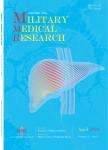Executive functioning in TBI from rehabilitation to social reintegration: COMPASS^(goal), a randomized controlled trial(grant: 1I01RX000637-01A3 by the VA ORD RR&D, 2013–2016)
Executive functioning in TBI from rehabilitation to social reintegration: COMPASS^(goal), a randomized controlled trial(grant: 1I01RX000637-01A3 by the VA ORD RR&D, 2013–2016)作者机构:Mental Health Service Washington DC VA Medical Center Med Star National Rehabilitation Hospital Med Star Health Research Institute Physical Medicine and Rehabilitation Service Washington DC VA Medical Center Research Service Washington DC VA Medical Center Texas A&M College of Medicine Rehabilitation Institute of Chicago Research Service Providence VA Medical Center
出 版 物:《Military Medical Research》 (军事医学研究(英文版))
年 卷 期:2015年第3卷第4期
页 面:181-200页
学科分类:1002[医学-临床医学] 10[医学] 1009[医学-特种医学]
基 金:supported by Merit Review Award#I 01 RX000637-01A3 from the United States Department of Veterans Af airs Rehabilitation Research and Development Service Program support for the preparatory phase of the project was provided through the Med Star Health Research Institute,a component of the Georgetown Howard Universities Center for Clinical and Translational Science supported by Grant U54 RR026076-01 from the National Center for Research Resources,a component of the National Institutes of Health
主 题:Executive function Traumatic brain injury Goal-setting Community reintegration Veterans Randomized controlled trial Manualized psychosocial intervention
摘 要:Background: Traumatic brain injury is a major health problem that frequently leads to deficits in executive function. Self-regulation processes, such as goal-setting, may become disordered after traumatic brain injury, particularly when the frontal regions of the brain and their connections are involved. Such impairments reduce injured veterans ability to return to work or school and to regain satisfactory personal lives. Understanding the neurologically disabling effects of brain injury on executive function is necessary for both the accurate diagnosis of impairment and the individual tailoring of rehabilitation processes to help returning service members recover independent ***/design: The COMPASSgoal(Community Participation through Self-Efficacy Skills Development) program develops and tests a novel patient-centered intervention framework for community reintegration psychosocial research in veterans with mild traumatic brain injury. COMPASSgoal integrates the principles and best practices of goal self-management. Goal setting is a core skill in self-management training by which persons with chronic health conditions learn to improve their status and decrease symptom effects. Over a three-year period, COMPASSgoal will recruit 110 participants with residual executive dysfunction three months or more post-injury. Inclusion criteria combine both clinical diagnosis and standardized scores that are 1 SD from the normative score on the Frontal Systems Rating Scale. Participants are randomized into two groups: goal-management(intervention) and supported discharge(control). The intervention is administered in eight consecutive, weekly sessions. Assessments occur at enrollment, post-intervention/supported discharge, and three months post-treatment ***: Goal management is part of the natural language of rehabilitation. However, collaborative goal-setting between clinicians/case managers and clients can be hindered by the cognitive deficits



